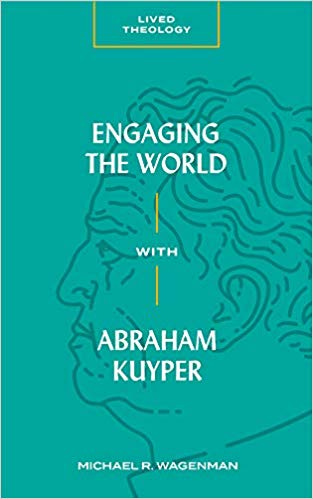Living a Theologically Engaged Life with Abraham Kuyper
When one thinks of the Dutch churchman Abraham Kuyper, one likely thinks of his most cited quotation: “There is not a square inch in the whole domain of our human existence over which Christ, who is Sovereign over all, does not cry: ‘Mine!’” (8). This powerful statement is a challenge to anyone who wants to be in control of some part of his or her life—which, of course, is everyone. It also captures a driving theme in Kuyper’s life: sphere sovereignty. The idea that Jesus is Lord of every sphere reorients humans in all areas of life, and Kuyper untiringly devoted his life to seeing how Christ’s sovereignty could be applied to every sphere of human existence.
Michael R. Wagenman explores these themes in his book Engaging the World with Abraham Kuyper* (Lexham, 2019). This is one of the first books in a new series by Lexham Press called Lived Theology. Michael A. G. Haykin, who writes the series preface, is presumably the series editor, though he is not explicitly identified as such. According to Haykin, the series is meant to put flesh and bones on theological convictions, showing how beliefs about the Christian God have led people to live out their faith in diverse contexts. The series seeks to introduce readers to well-known and lesser-known figures in church history through accessible books, all with this goal in mind:
to remember what lived theology looks like. And in remembering this, we hope that these Christians’ responses to their historical contexts and cultures will be a source of wisdom for us today. (xx)
This is an aim I certainly applaud and appreciate. I think we can gain much from the past for living in the present and future, especially as we seek to be historically sensitive interpreters of the past.
Wagenman makes a good effort in just such a goal. Engaging the World with Abraham Kuyper* presents a portrait of Kuyper as a determined promoter of Christianity and an active resister of Enlightenment-era ideologies, particularly in their revolutionary forms. Kuyper saw many dangers in the rise of modernist thinking, which he believed was undermining the place of Christian belief in society, and he sought to bring about his vision for a Christian society in several spheres—including education, media, the church, socioeconomic concerns, and politics. He established the Free University of Amsterdam, founded and ran two newspapers, formed a new denomination, championed reforms in the age of industrial growth and increasing abuses of employees, and helped found a new political party and served in public office, including the office of prime minister in the Netherlands.
No one can deny Kuyper’s involvement in the issues of his day, and Wagenman makes a point to show that he has something to say to our day, when the church faces many challenges in each of the spheres in which Kuyper was active. Every chapter of the book includes a “For Today” section, in which Wagenman offers suggestions for learning from Kuyper in our context, all while attending to important differences between ours and his. As one example, in thinking on Kuyper’s involvement in social issues, Wagenman echoes Kuyper’s thinking for our day in saying that “there are no ‘personal’ financial decisions”; all financial decisions should consider the needs of our fellow human beings (93).
I found the conclusion to be the most fascinating chapter. There Wagenman is careful to show some problems in Kuyper’s lifestyle. What may come as no surprise, given his accomplishments described above, is that Kuyper overworked himself—and he suffered breakdowns because of it. What surprised me, however, was that in his later years, Kuyper stopped attending church. He found it a better use of time to work on his tasks than to spend time in the corporate life of God’s people. Wagenman rightly criticizes Kuyper for this nearsightedness and arrogance. Kuyper’s style of leadership and work also alienated him; one of Kuyper’s contemporaries said that Kuyper had “disciples but no colleagues” (123).
Despite the book’s commendable content, I was distracted by a number of copyediting and typesetting issues in it. Here are a few representative examples:
some misspellings (e.g., “bulling” instead of “bullying,” 41; “lead” instead of “led,” 45)
a quotation lacking a citation (86)
bad word division across a line (e.g., “worl-dview” rather than “world-view,” 42)
the occurrence of “his his” across a page break, the last word on 5 and the first word on 6
Another concern in the production of the book is the subject index. There every term is capitalized (including terms like “Dualism” and “Technology”), even though terms in an index should reflect how they appear in the book. And some terms are not italicized that should be (e.g., The Herald, The Standard). Oddly, these names of newspapers that Kuyper started are alphabetized under The, when The should be omitted (following The Chicago Manual of Style, 17th ed.; see 16.48). In other words, the index has the earmarks of a cheaply produced (possibly computer-generated) index—one marked more by typesetting errors and brevity than helpfulness.
One can hope that Lexham Press will avoid these types of problems in future reprints of this book and in other books in the series. For the Lived Theology book series certainly has promise, showing readers how theology has shaped the lives of Christians for centuries.
Where I think Wagenman especially excels in Engaging the World with Abraham Kuyper* is in his aim to present Abraham Kuyper not as a figure that one group today can champion but as a figure that challenges all groups today in one way or another. And his critical engagement with Kuyper’s lifestyle shows the marks of careful historical interpretation. If such characteristics mark further books in the Lived Theology series, it will offer valuable benefits to the modern-day church.
----------
* Amazon affiliate link


